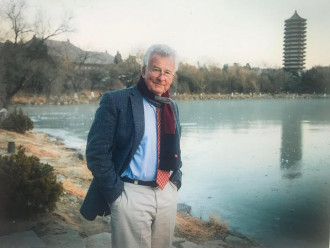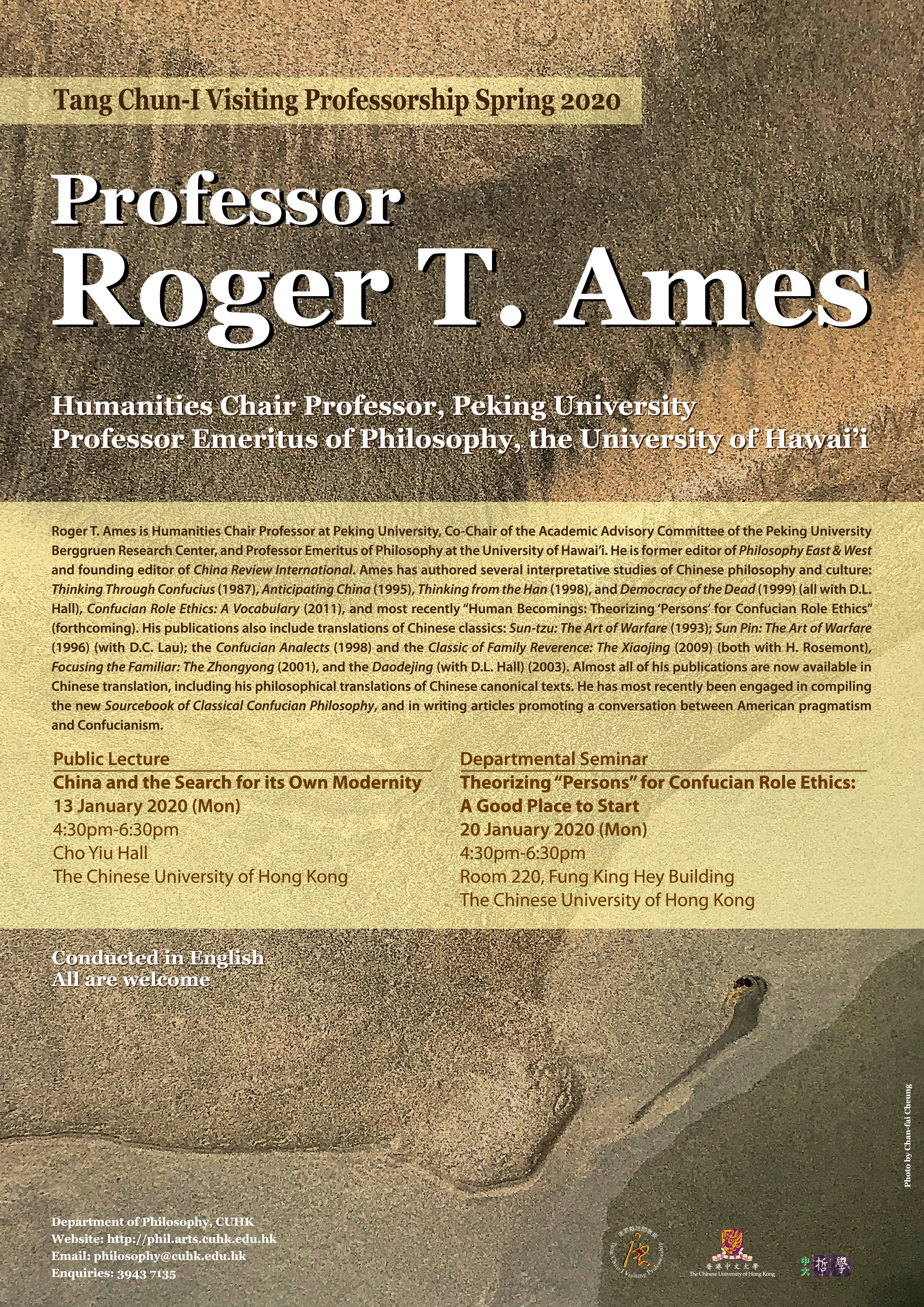
Roger T. Ames
Professor Roger T. Ames
Humanities Chair Professor, Peking University
Professor Emeritus of Philosophy, the University of Hawai’i
Roger T. Ames is Humanities Chair Professor at Peking University, Co-Chair of the Academic Advisory Committee of the Peking University Berggruen Research Center, and Professor Emeritus of Philosophy at the University of Hawai’i. He is former editor of Philosophy East & West and founding editor of China Review International. Ames has authored several interpretative studies of Chinese philosophy and culture: Thinking Through Confucius (1987), Anticipating China (1995), Thinking from the Han (1998), and Democracy of the Dead (1999) (all with D.L. Hall), Confucian Role Ethics: A Vocabulary (2011), and most recently “Human Becomings: Theorizing ‘Persons’ for Confucian Role Ethics” (forthcoming). His publications also include translations of Chinese classics: Sun-tzu: The Art of Warfare (1993); Sun Pin: The Art of Warfare (1996) (with D.C. Lau); the Confucian Analects (1998) and the Classic of Family Reverence: The Xiaojing (2009) (both with H. Rosemont), Focusing the Familiar: The Zhongyong (2001), and The Daodejing (with D.L. Hall) (2003). Almost all of his publications are now available in Chinese translation, including his philosophical translations of Chinese canonical texts. He has most recently been engaged in compiling the new Sourcebook of Classical Confucian Philosophy, and in writing articles promoting a conversation between American pragmatism and Confucianism.
China and the Search for its Own Modernity

Abstract:
In this lecture I will argue that China is only now, two decades into the 21st Century, beginning to produce its own indigenous modernity. Beginning in the second half of the 19th Century, China along with the other East-Asian cultures, enamored of and overwhelmed by Western modernity, constructed a new conceptual vocabulary that would enable these traditions to synchronize their own cultural past and aspirations for the future with a foreign language of modernity. The structures and curricula of Western education were imported wholesale into the East-Asian academy, allowing Asian scholars access to the apparatus of new knowledge production, but at a cost to their own identity. The consequences of this effort are still with us as Western modernity continues to be the language through which East-Asian traditions are conceptualized and theorized not simply abroad, but within their own academy.
One way forward to an understanding of China’s own modernity is to reflect on the skewed way in which Chinese language translations, to use the language of Friedrich Schleiermacher, have been “domesticated.” That is, although pubian 普遍 is a translation of the Western idea of “universal,” it means “pervasive, common, shared” in the way it has been deployed. Chaoyue 超越 as a translation for “transcendence,” means the outer limits of an inside rather than the notion of strict, philosophical transcendence: an external, independent, universal, self-sufficient standard.
Perhaps the most interesting phenomenon is that within the contemporary Western narrative, the process language being developed to replace the now discredited transcendent universalism is in important degree resonant with the vocabulary of Confucian philosophy.
Theorizing “Persons” for Confucian Role Ethics: A Good Place to Start

Abstract:
In 2011, I published Confucian Role Ethics: A Vocabulary in which I argue that Confucian philosophy’s encounter with Western ethical theory is not its defining moment. Indeed, I try to use the Confucian ethical vocabulary to express its own sui generis vision of the moral life as Confucian role ethics. On reflection, I am not sure that I have been able to convey in sufficiently clear terms the Confucian conception of a relationally-constituted person. At the same time, I am persuaded that this is one of the most important contributions Confucian philosophy has to make to our contemporary ethical, social, and political discourse as a robust alternative to single actors playing to win.
G.W.F. Hegel in the introduction to his Encyclopaedia Logic famously observes that one of the most difficult problems in any philosophical investigation is the question of where to begin. In this lecture, I will argue that the appropriateness of categorizing Confucian ethics as role ethics turns largely on the conception of person that is presupposed within the interpretive context of classical Chinese philosophy. If our goal is to take the Confucian tradition on its own terms and to let it speak with its own voice without overwriting it with our own cultural importances, we must begin by first self-consciously and critically theorizing the Confucian conception of person as the starting point of Confucian ethics.
The problem of using Western categories—today, virtue ethics—to theorize Confucian philosophy is an old and persistent story. In our own time, but with deep roots in the classical Greek philosophical narrative, individualism has become a default, commonsense assumption, if not an ideology. I will argue that the vocabulary of agents, acts, generic virtues, character traits, autonomy, motivation, reasons, choice, freedom, principles, consequences, and so on, introduces distinctions that assume this foundational individualism as its starting point.
And further, I will claim that Confucian ethics by contrast begins from the wholeness of experience, and is formulated by invoking a radically different focus-field cluster of terms and distinctions with fundamentally different assumptions about how personal identities emerge in our human narratives, and how moral competence is expressed as an achieved virtuosity in the roles and relationships that come to constitute us. To fail to distinguish what I will call individual human “beings” from relationally-constituted “human becomings,” then, would mean that we have willy-nilly insinuated a contemporary and decidedly foreign notion of person into our investigation before it has even begun.



